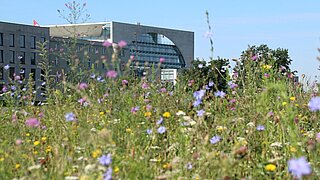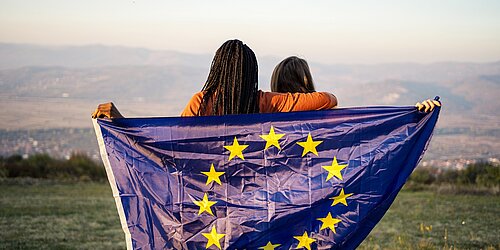Copyright: NABU / Felix Conrad
Project background
In order to enable Germany and Europe to deal with the effects of the loss of biological diversity and climate change, both economic and social life need to change and undergo an extensive transformation towards sustainable production and consumption patterns. This requires viable concepts in terms of how a sustainable food supply as well as the environmentally-compatible provision and proper use of biomass can be ensured in the years to come. This undertaking must take into consideration the simultaneous creation of spaces for biologically diverse landscapes to ensure the preservation of biodiversity, climate change mitigation and the protection of soil, air and water.
Bioeconomy represents an economic system based on renewable raw materials and creates a range of opportunities against the background of the species and climate crisis. However, it can only enable the production of healthy fodder and food, industrial raw materials or building materials, and generate important development impulses in rural areas if it is shaped sustainably. Furthermore, it can support essential ecosystem activities such as pollination, carbon storage, air filtration and microclimate regulation.
A sustainable bioeconomy as a device for the transformation to sustainable production and consumption patterns requires visionaries. The project aims to use and strengthen such visionaries as instigators for shaping a sustainable bioeconomy in Germany. For this, regionally specific, proven bioeconomy projects from Germany and Europe, which at the same time make an important contribution to environmental protection and nature conservation, will be identified. Workshops will be held to network identified projects and bring them into an exchange with researchers, civil society and decision-makers from politics and administration. Using interviews with these actors as its basis, the project presents the bioeconomy visions of these role models to the public in a graphically appealing booklet of ideas.
The project, with its cross-disciplinary approach, enables a so-called participatory technological impact analysis: the exchange between the above-mentioned stakeholders enables conflict potentials, hurdles as well as systemic risks of bioeconomic applications to be handles. Political recommendations for action for the application in Germany are finally summarised as to how the bioeconomy can contribute to the socio-ecological transformation and which framework conditions are necessary for this.
In scientific literature so far, visions and ideas of various stakeholders have been examined. Public discussion on future ideas regarding the role of the bioeconomy is less systematic. The active participation of society can achieve a socially robust understanding of the conflicts, opportunities and hurdles of the bioeconomy, thus making a useful contribution to socio-ecological transformation. Strengthening societal participation is called for as part of the National Bioeconomy Strategy, which was published at the beginning of 2020.
Project goals and measures

Copyright: NABU / Eric Neuling
A sustainable bioeconomy as a device for the transformation to sustainable production and consumption patterns requires visionaries. The project aims to use and strengthen such visionaries as instigators for shaping a sustainable bioeconomy in Germany. For this, regionally specific, proven bioeconomy projects from Germany and Europe, which at the same time make an important contribution to environmental protection and nature conservation, will be identified. Workshops will be held to network identified projects and bring them into an exchange with researchers, civil society and decision-makers from politics and administration. Using interviews with these actors as its basis, the project presents the bioeconomy visions of these role models to the public in a graphically appealing booklet of ideas.
The project, with its cross-disciplinary approach, enables a so-called participatory technological impact analysis: the exchange between the above-mentioned stakeholders enables conflict potentials, hurdles as well as systemic risks of bioeconomic applications to be handles. Political recommendations for action for the application in Germany are finally summarised as to how the bioeconomy can contribute to the socio-ecological transformation and which framework conditions are necessary for this.
